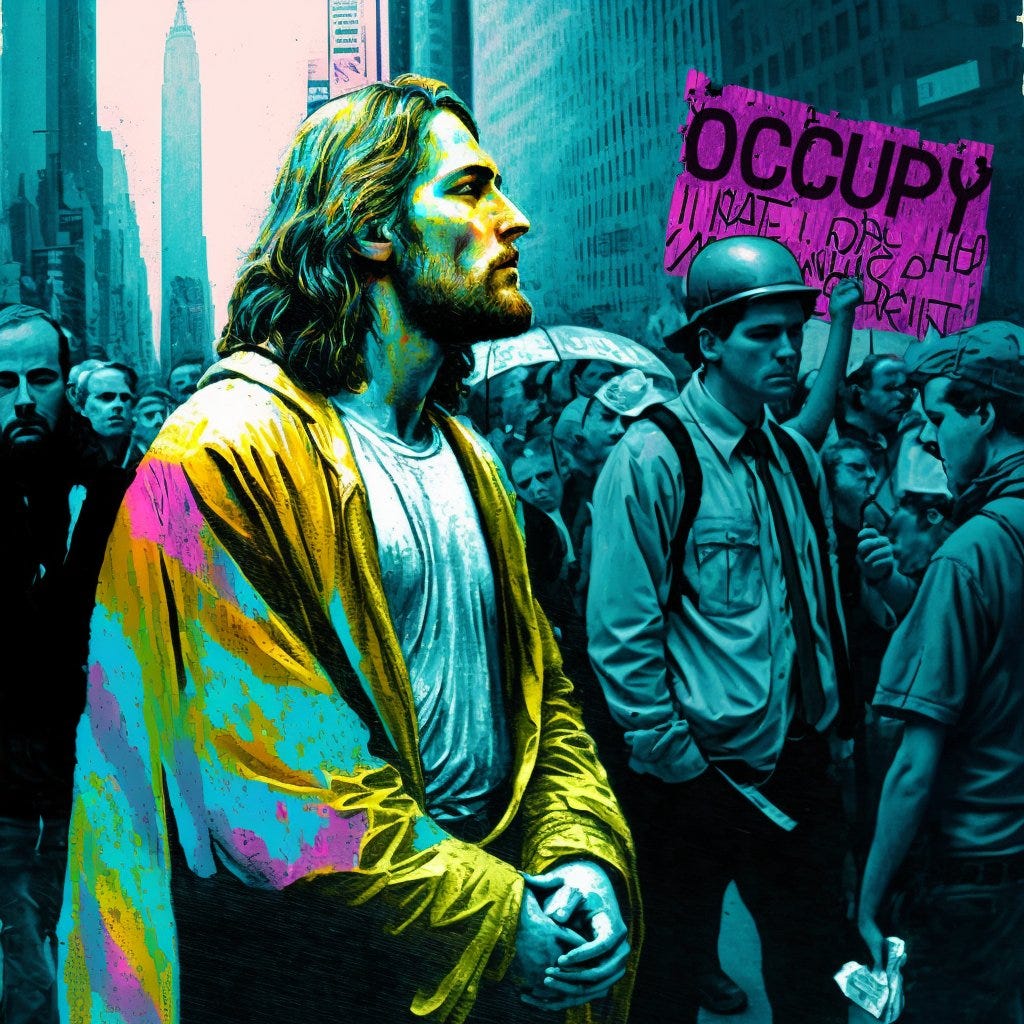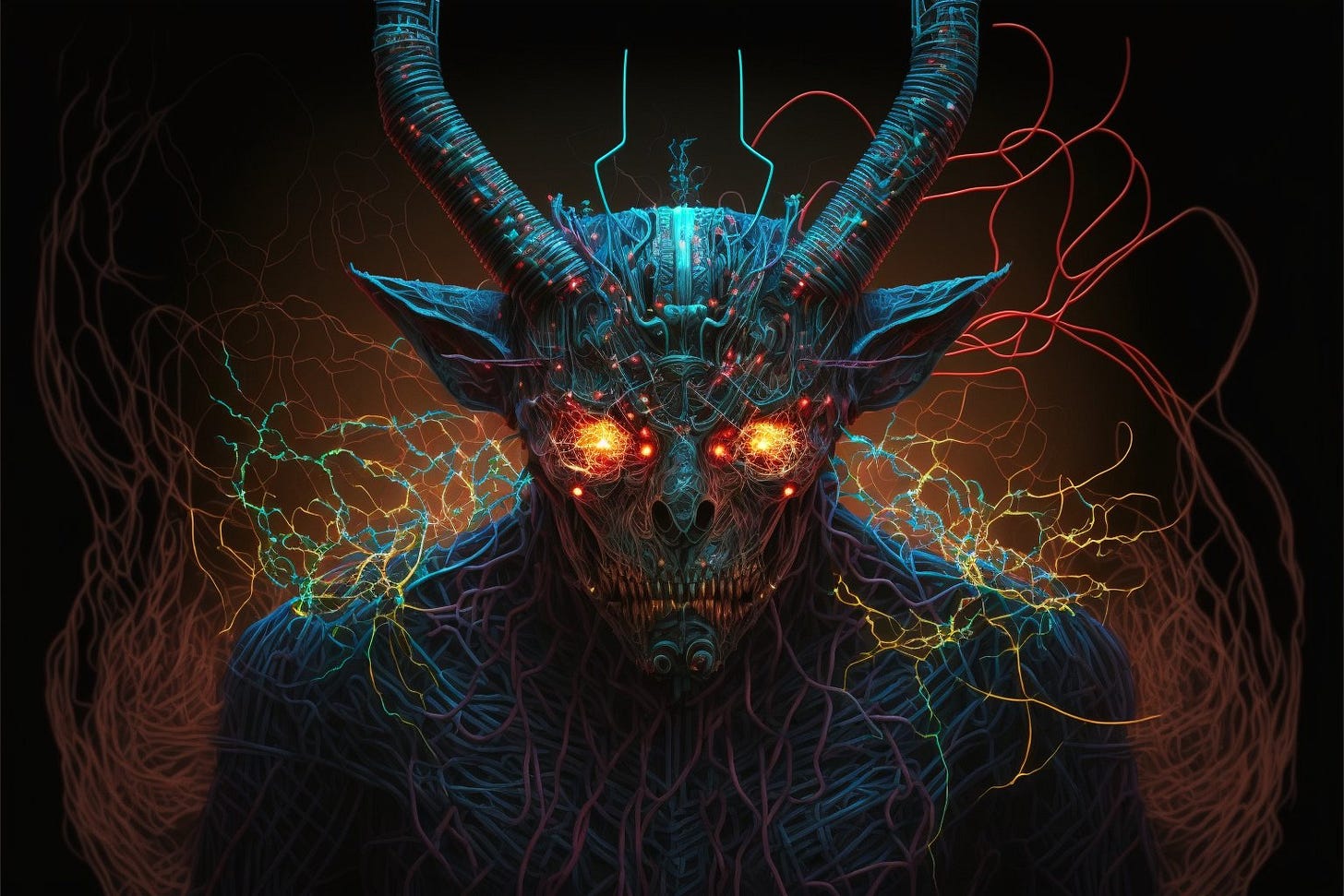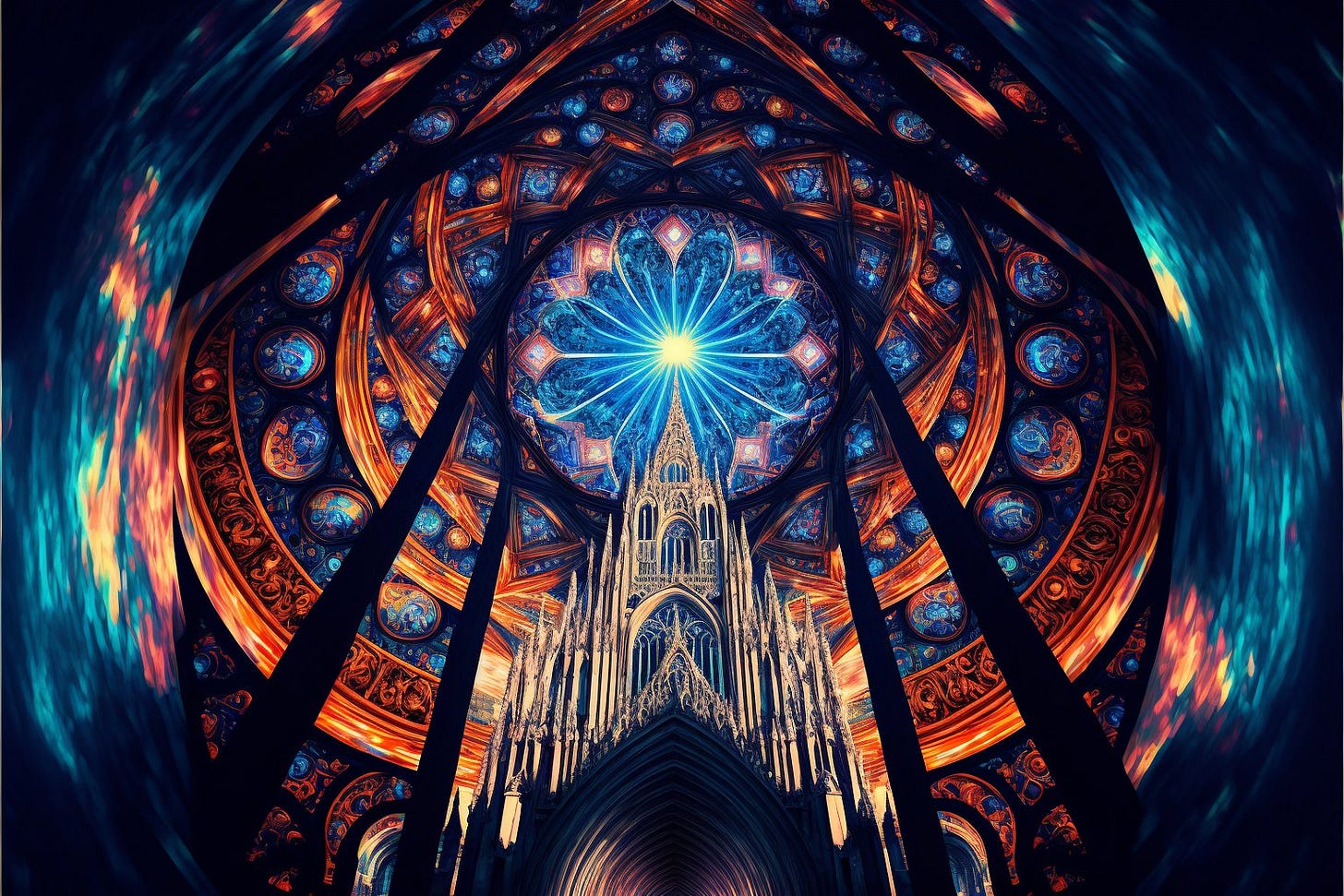This is a story about my surprising turn back towards Christianity, 15 years after being excommunicated. It’ll take about 10 minutes to read, so I would love it if you settle in with a cup of tea and listen to King’s College Choir singing Miserere mei, Deus (“Have mercy on me, O God”) while you read.

I’ve been telling the story of my life over and over with the same dramatic arc. If you’ve heard me talking on a podcast anytime in the last few years, you’ll recognise these same three chapters:
Chapter 1: Part of The Flock
The story opens with my fundamentalist Christian upbringing, where I’m being indoctrinated into a literal understanding of the Bible. I really try to believe, but my doubts start piling up as I learn to think for myself. Usually I tell this part of the story in a tone of regret & pain, fixated on the injustice & trauma of being raised in a context where my belonging was conditional on my beliefs.
Chapter 2: The Excommunication
Chapter 2 begins with a letter: a few days before my 23rd birthday I receive formal notice that I’ll be excommunicated from the church. My refusal to submit to church doctrine has reached its natural conclusion. Four years I spend adrift without belonging or purpose. It’s a sad chapter, but I’m sad in a cool way like Kurt Kobain or Hunter S. Thompson. Imagine me taking a drag on a cigarette while telling you “I may be lost... but at least I’m not deluded.”
Chapter 3: A New Hope
Chapter 3 kicks in with the surge of the Occupy Movement in 2011, and quickly continues from there on to Enspiral & Loomio. Dramatic music swells. At last! I have a righteous mission again. I’m welcomed into a community of activists & social entrepreneurs, reinstated into fellowship after so long out in the cold. I was lost, and then I was found!
So that brings us to the present day. Maybe you can infer from the tone of my writing that I’m rolling my eyes as I tell you my life story with these 3 chapters. When you find yourself bored of your own life story, that’s a sure sign that something new is coming!
Dear reader, I find myself at the start of a new chapter, with unmistakable resemblance to the parable of The Prodigal Son. Instead of whining about the injustice of my childhood, I’m starting to see it as the best possible start in life. My resentment is being replaced by gratitude.
The chances of me returning to fundamentalism are approximately zero, but for the first time in my adult life I’m actively seeking wisdom in Christian thought. My reactivity against church is being replaced with curiosity & fondness. So in this issue, I’m going to share some of the gems I’ve found as I undo the divorce from my Christian lineage.
Angels in Scientific Terms
Back in June, my big bro sent me a conversation between John Vervaeke (probably my favourite contemporary philosopher) and Jonathan Pageau (a Christian thinker I’d never heard of before). They talk about collective intelligence; the way a large network of connected people can produce some kind of emergent semi-conscious higher being: watch or listen.
The meta-conversation had a bigger impact on me than the content. Pageau is Christian and Vervaeke is not, but their mutual admiration & friendly respect is more than enough to span their deep philosophical differences. It’s so sweet to watch each of them carefully open up and take joy in learning from the other. Neither is badgering the other one to adopt his beliefs. It’s rare to see intellectuals sitting so comfortably in this pluralistic solidarity and emotional attunement.
Pageau is from the Eastern Orthodox tradition, a distant cousin of the Protestant faith of my childhood. His and my branches of the church family split all the way back in 1054. We share many of the same stories — we just derived different lessons from them. He sees a rich world of ambiguous symbols & living spirits where I was raised to see literal facts & inanimate rules.
This is what is so exciting about my reacquaintance with Christian tradition: I’m learning to see new levels of meaning in stories I had formerly discounted as naïve. The simple literal interpretation I was raised with provides comfort & guidance to billions of people, but not to me. Now I’m returning to these stories with renewed affection, I’m starting to see there’s a more complex metaphorical understanding available for those of us who can’t stomach the literal reading.
Take for example the story of the Fall in Genesis, when Adam & Eve are cast out from the Garden of Eden because they ate the forbidden fruit. Idealist philosopher Bernardo Kastrup blew my mind when he suggested you can read this as an allegory of the moment in history when humans developed symbolic thought, 100,000 years after we’d been anatomically modern humans. It’s a story about how we were ripped out of the web of animal instinct when we developed sufficient self-consciousness to be morally culpable for our choices. Suddenly, we gained the “knowledge of good and evil”. (Follow his argument from 1:21 in this video.)
Casting The Demons Out Of Social Media
Let me spell it out: if we can quit our contempt for traditional religion, I think we’ll find a lot of useful insights about how to act wisely in the world today.
For example, on Halloween I wrote this twitter thread reflecting on how polarised political discourse plays out like demon possession. You’ve seen it right? Someone says the wrong phrase and BOOM, everyone is triggered, the conversation devolves into a ping pong match of mutually escalating antagonisms. When you’re in the grip of intense emotions, your agency is temporarily unavailable, you're controlled by unconscious reactivity, like a puppet jerked around by invisible strings. You’re possessed.
In that thread I’m mostly recycling ideas I’ve heard on The Stoa discussed by really smart people trying to get a grasp on the weird emergent dynamics of social media discourse. Instead of “demon”, they prefer labels like “Egregores” or “Intersubjective Parasites”.
Sure, in some technical theoretical sense it may be more accurate to describe this phenomena as an “egregore”, but “demon possession” strikes me as much more useful. “Egregore” is a head scratcher but “demon” needs no explanation. My parents know what demons are. My great- great- great- great- great-grandparents too.
If you’re in the mood for a rabbithole, listen to exorcist Father Malachi Martin describing his techniques for casting out demons. He removes distracting elements and uses prayers & blessings to demarcate a protective space. He gains control over the demon by knowing its name, calling it out precisely, and invoking a higher authority. He never answers the question of someone who is demon possessed.
Brother, sister, would you believe you can use the same techniques to exorcise memetic demons on social media!
By reconnecting to this old set of stories I feel like I’m getting a power-boost from past generations. Instead of having to invent everything from scratch, I’m seeing my ancestors as active present allies with wisdom to share.
As Iron Sharpens Iron
One of the people who has had the most influence on my renewed interest in church is Christian intellectual Elizabeth Oldfield. We met in an online microsolidarity group initiated by our mutual friend Ronan Harrington at the start of the pandemic.
Liz recently interviewed me to help me think through my changing relationship to religion. One of the stories I shared in that conversation was how marriage has changed me.
I met my wife Nati in the first days of the Occupy movement, right there on the opening page of Chapter 3 of my life story. Over the years, we developed new layers of partnership: friends, colleagues, lovers, now co-pilots for each other’s lives.
Because we met at Occupy, our partnership was constructed on anarchist principles: no gods, no masters. Despite weaving our lives together in increasingly deep commitment, I never imagined we would eventually be married. I saw marriage as the opposite of our values, a vestigial organ of the old patriarchal dominator culture.
So in 2019 when we decided to marry for immigration reasons, there was no romance or reverence, it was just paperwork, a formality.
Now, as we approach our 4th anniversary it’s obvious that marriage rendered a deep change in me. I’m like the unwitting recipient of a potent magic spell: I was a partner, now I’m a husband.
Partner is a relatively new concept in family relationships. I don’t have great role models of how to be an awesome “partner”. But “husband” has an enormous lineage. Take a time machine back 5000 years and everyone will still know what a husband is.
I don’t have to make it up. I can look to my parents’ relationship for the pattern. They stuck together through extreme stressors: bereavement, bankruptcy, psychosis... They showed me what unbounded mutual commitment looks like, so now it’s effortless for me to step into the same posture with Nati.
Mum & Dad didn’t have to make it up either, they took their instruction directly from the Bible: “the two shall become one flesh”. The recipe for a good marriage is right there in Genesis: make the needs, desires & pains of your spouse as important as your own. Be as transparent with them as you are to yourself. Simple.
So far I’m doing a pretty decent job of being a husband, not because I’m especially brilliant, but because husbandship was programmed into me by my cultural inheritance.
As I soften my antagonism against religion, I can see what’s good in this “husband & wife” tradition, no longer completely preoccupied by all the examples of how it can be shitty. I’ve stopped thinking of myself as Nati’s “partner” and surrendered into this “husband” role. And so I’m coming to see myself as basically the same as my dad, rather than thinking of myself as basically his opposite. That’s big magic.
As I write this now I’m seeing that Chapter 3 was about sourcing authority from inside of myself, and finding community with other self-authoring people. The new chapter I’m currently writing allows for the possibility of an authority outside of myself, something bigger, stronger, wiser, gentler, kinder than I will ever be. Something I can rely on, lean on, surrender into. God, what a relief to surrender!
The Pursuing Father
I don’t think this story would be worth sharing if it were just about me. Really I want you to think about all the people alive today who are also divorced from traditional religious lineage. Maybe not as recently divorced as me, but in the last couple of generations. How many of your agnostic peers had Christian great-grandparents?
Brother, sister, I’m not writing this to convert you to Christianity, that’s not the point at all. But I want you to really consider how our discourse might change if we stopped treating our forebears as primitive bumpkins? What could we learn if we imagine they might have access to perennial wisdom, ways of thinking & living that are especially useful in times of intense uncertainty & fear? What if we saw the great cathedrals of Europe not as tourist curiosities or “art history” but as a precious gift from our ancestors, a reminder of what is most important in life? What if we saw the people who lived before us not as dead footnotes in our story but as active present allies who packaged their best lessons into our cultural inheritance?
I wish I could tell you what a profound difference this shift in perspective has made to me.
I spent more than a decade absolutely convinced that my parents had made a terrible error by raising me in the church. I called it ‘metaphysical blackmail’ – believe, or else. I was forced to make a brutal choice: to have a community, or to trust my own intelligence. I don’t know how to put my rage & grief into words, it’s been such a heavy dark load to carry around all these years.
But on Christmas morning while I was out walking under the soft rain, a narrow beam of sunshine slipped through a gap in the clouds, kissed my forehead and stopped me in my tracks. I shit you not, it happened just like this. I stood there crying in the street with the sun and the rain and the tears on my cheeks. In my head I was retelling my life story for the 6 millionth time, but somehow I popped out of myself and teleported into my Dad’s role. I was seeing the story play out through his eyes. I watched as his hand reached out towards me. I felt the pure love in his heart, and I knew the truth of it. No threat, no neglect, no judgement, only love. I cried because I realised he’s been standing there this whole time, since before I was even born, reaching towards me always only with love.
My big bro told me the parable of the prodigal son is not about the son’s change of heart. It’s about the pursuing father: the unreasonable lengths he goes to, to bring his boy back into the family. That’s the image I want to leave you with. I don’t want to persuade you about some literal propositions about God or metaphysics. I just want to invite you to imagine for a second, to feel what it would be like if it were true, that there’s a cosmic Father out there, faithfully reaching towards us with a loving embrace. Whether you call him God or evolution it doesn’t matter, I just want you to imagine that this painful puzzling life is organised exactly as it should be, that this story has a happy ending, and love is on your side.
Merry Christmas from your little bro,
Richard D. Bartlett







That was a thrilling read, especially with the Miserere playing in the background. I particularly liked this line “What if we saw the great cathedrals of Europe not as tourist curiosities or “art history” but as a precious gift from our ancestors, a reminder of what is most important in life?”. As a fellow Christian I’d like to say welcome back! It is truly wonderful that his love extends to us when we are furthest from him.
Richard,
I recently left my literalist/fundamentalist Christian group ~ 1.5 years ago, which certainly soured my relationship with anything “religious”.
I’m 23 and not as far along the journey as you, but so much of what you’re saying rings so true.
It’s a weird arch, to go from a literalist understanding of the Bible (believe, or else) to see the value and wisdom of metaphors and meaning embedded in these texts.
Thank you for sharing some insights gained by your ongoing journey; it made me felt seen.
(Some day I’d love to chat with you about your background/past; it sounds oddly familiar.)
Cheers!